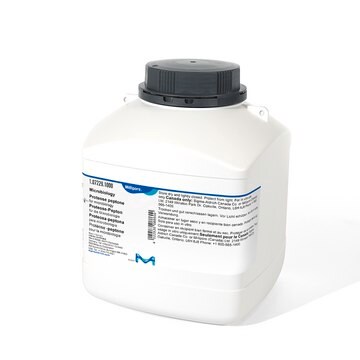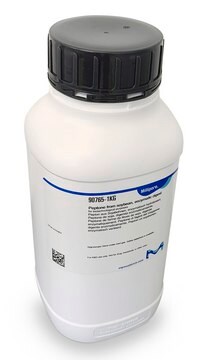Recommended Products
biological source
animal (meat)
Quality Level
form
powder
nitrogen analysis
≥10% total
loss
≤6% loss on drying
application(s)
microbiology
InChI
1S/C13H24O4/c1-6-13(3,7-2)9-8-10(11(14)16-4)12(15)17-5/h10H,6-9H2,1-5H3
InChI key
AIUDWMLXCFRVDR-UHFFFAOYSA-N
Looking for similar products? Visit Product Comparison Guide
Related Categories
General description
Application
- to prepare neutralizing solution for viable cell count assay
- to prepare decimal dilutions of the sample (cheese) for microbiological analyses
- in bolus liquid solution of amino acids to examine the effect of amino acid infusion in the stomach or intestine on specific dynamic action (SDA)
Storage Class Code
11 - Combustible Solids
WGK
WGK 3
Flash Point(F)
Not applicable
Flash Point(C)
Not applicable
Personal Protective Equipment
Regulatory Listings
Regulatory Listings are mainly provided for chemical products. Only limited information can be provided here for non-chemical products. No entry means none of the components are listed. It is the user’s obligation to ensure the safe and legal use of the product.
JAN Code
P7750-500G:
2540058:
P7750-VAR:
P7750-PM:
P7750-100G:
P7750-1KG:
2502010:
P7750-BULK:
Certificates of Analysis (COA)
Search for Certificates of Analysis (COA) by entering the products Lot/Batch Number. Lot and Batch Numbers can be found on a product’s label following the words ‘Lot’ or ‘Batch’.
Already Own This Product?
Find documentation for the products that you have recently purchased in the Document Library.
Customers Also Viewed
Our team of scientists has experience in all areas of research including Life Science, Material Science, Chemical Synthesis, Chromatography, Analytical and many others.
Contact Technical Service









